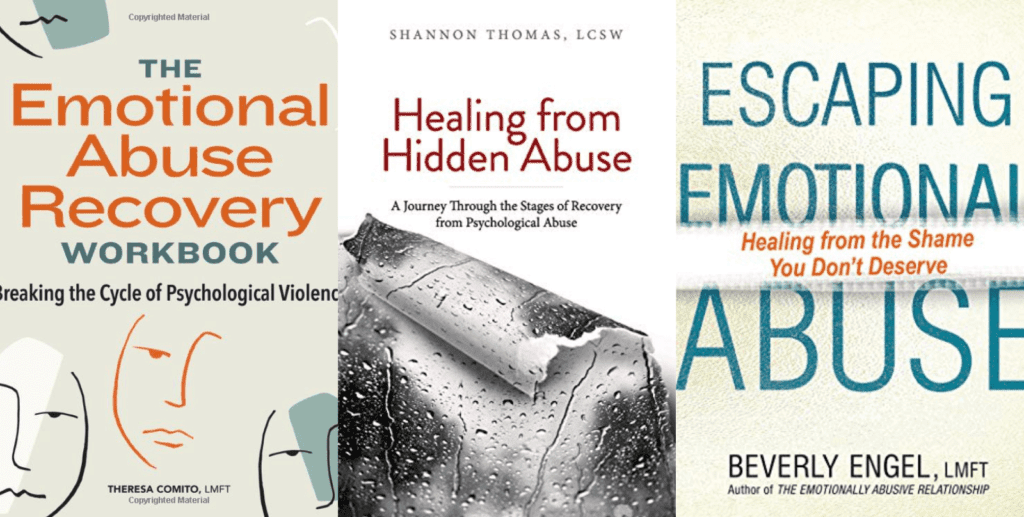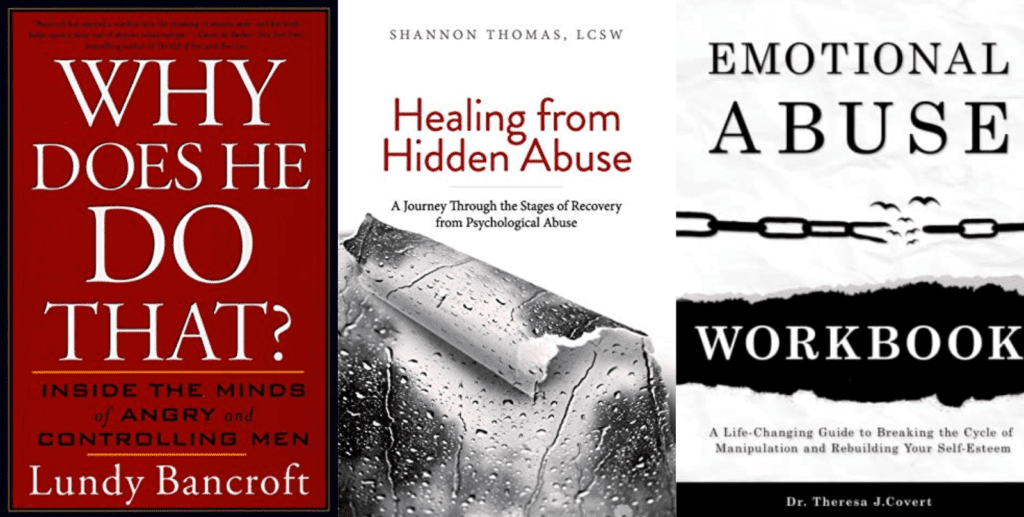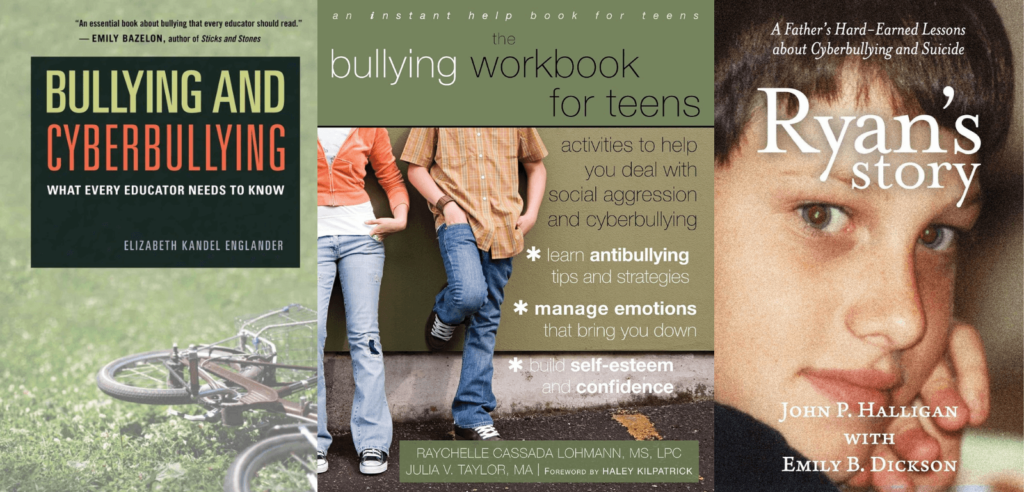The following are some of the best emotional abuse books to help you on your recovery journey.
- What Is Emotional Abuse?
- Emotional Abuse Books
- 1. Healing from Hidden Abuse
- 2. The Emotional Abuse Recovery Workbook
- 3. Escaping Emotional Abuse
- 4. Emotional Blackmail
- 5. Emotional Abuse Workbook
- 6. Healing the Scars of Emotional Abuse
- 7. Healing from Toxic Relationships
- 8. The Gaslighting Recovery Workbook
- 9. The Emotional Abuse Recovery Journal
- 10. Signs of Emotional Abuse
- How Emotional Abuse Books Can Help?
- Conclusion
Disclosure: Some of the links below are affiliate links. This means that, at zero cost to you, I will earn an affiliate commission if you click through the link and finalize a purchase.
What Is Emotional Abuse?
Emotional abuse is a form of psychological maltreatment that involves behaviors and tactics aimed at undermining an individual’s self-esteem, self-worth, and emotional well-being.
It is characterized by repeated patterns of harmful actions or speech intended to manipulate, control, or degrade the victim.
Unlike physical abuse, emotional abuse does not leave visible scars but can have severe and long-lasting effects on a person’s mental health.
Examples of emotional abuse include:
1. Verbal attacks: Frequent yelling, name-calling, or using derogatory language to belittle or humiliate the victim.
2. Constant criticism: Consistently pointing out flaws, failures, or mistakes to undermine the victim’s confidence.
3. Gaslighting: Manipulating the victim’s perception of reality, causing them to doubt their memory, judgment, or sanity.
4. Insults and humiliation: Publicly embarrassing or shaming the victim, often in front of others.
5. Isolation: Restricting the victim’s contact with friends, family, or support systems, making them feel alone and dependent on the abuser.
6. Controlling behavior: Exerting excessive control over the victim’s daily activities, decisions, or access to resources, limiting their autonomy.
7. Emotional neglect: Ignoring or dismissing the victim’s emotional needs, invalidating their feelings, or withholding affection as a means of punishment or control.
8. Threats and intimidation: Using fear, coercion, or threats of harm to manipulate or gain power over the victim.
9. Stalking or monitoring: Intrusively monitoring the victim’s movements, online activities, or personal communications without their consent.
10. Withholding love or affection: Using love, attention, or affection as leverage, alternating between periods of affection and emotional withdrawal to maintain control.
Emotional abuse can occur in various types of relationships, including romantic partnerships, parent-child relationships, friendships, or workplace settings.
Emotional Abuse Books
1. Healing from Hidden Abuse
By Shannon Thomas LCSW
Healing from Hidden Abuse walks the reader through each of the six recovery stages researched and developed by the author. The stages are Despair, Education, Awakening, Boundaries, Restoration, and Maintenance.
A guided Personal Reflections journal is included in the back of the book to help the reader go deeper in their application of the six stages of recovery. The journal can be used individually or in a small group setting.
Related: Healing From Emotional Abuse In 12 Practical Steps
2. The Emotional Abuse Recovery Workbook
By Theresa Comito LMFT
In this workbook you’ll learn to:
- Identify emotional abuse—Begin to recognize, acknowledge, and understand the dynamics of emotional abuse, and start your recovery process.
- Take action—Move into guided examinations of your relationships. Make an exit plan with boundaries and safety nets to build new, healthier skills, and rediscover self-compassion and self-care.
- Move forward—Avoid repeating old patterns. Rebuild. Map out next steps into healthier relationships and greater independence while you enhance your network of supporters.
Related: How To Stop Being Emotionally Abusive? Top 10 Strategies To Break The Cycle Of Abuse
3. Escaping Emotional Abuse
By Beverly Engel
In The Emotionally Abused Woman, therapist Beverly Engel introduced the concept of emotional abuse, one of the most subtle, yet devastating forms of abuse within a relationship. Now Engel exposes the most destructive technique the abuser uses to break our spirit and gain control–and guides readers on how to free themselves from the shame that can keep them from the life (and the love) they deserve.
Related: Am I Emotionally Abusive Quiz
4. Emotional Blackmail
By Susan Forward, Donna Frazier
A practical guide to better communication that will break the blackmail cycle for good, by one of the nation’s leading therapists, Susan Forward.
Susan Forward presents the anatomy of a relationship damaged by manipulation, and gives readers an arsenal of tools to fight back.
Related: 8 Stages Of Healing After Narcissistic Abuse (+FREE Breakup Recovery Worksheets)
5. Emotional Abuse Workbook
By Dr.Theresa J. Covert
This book includes:
– Trauma Bonding: Why you CAN’T Leave an Abusive Relationship
– How to outsmart narcissists silent treatment and end the pain today
– The psychological disorders that feed emotional abuse
– Unhealthy vs Healthy relationships: The signs you need to know
– The easiest ways to identify emotional abusers FAST
– 13 Must know signs of Emotional Abuse
– What you MUST do to LEAVE an Emotionally Abusive Relationship
– BOUNDARIES you MUST set with an abuser
– How To Forgive When You Can’t Forget
– The Reasons why Empaths attract toxic people and how to protect yourself
– Emotional healing: Techniques to overcome negative emotions
– The steps to create an abuse-free future
And so much more …
Related: Healing From Childhood Emotional Neglect In 6 Steps (+FREE Worksheets PDF)
6. Healing the Scars of Emotional Abuse
By Gregory L. Jantz Ph.D, Ann McMurray
In this helpful guide, Dr. Gregory L. Jantz reveals how those who have been abused by a spouse, parent, employer, or minister can overcome the past and rebuild their self-image. This revised and updated edition of Healing the Scars of Emotional Abuse includes:
• strategies for dealing with the verbal abuser
• self-check quizzes with each chapter
• keys to rebuilding relationships
• letters from survivors of emotional abuse
• new information on dealing with spiritual abuse
• and a biblical plan for healing.
Related: Best 5 Books For Childhood Emotional Neglect
7. Healing from Toxic Relationships
By Stephanie Moulton Sarkis PhD
Highlighting ten essential steps, Dr. Sarkis provides survivors with an accessible framework that can be applied to anyone preparing to heal:
1. Block or Limit Contact
2. Create Your Own Closure
3. Forgive Yourself
4. Establish Boundaries
5. Talk to a Professional
6. Practice Self‑Care
7. Reconnect
8. Grieve
9. Look Outward
10. Prevent: Keeping Toxic People Away
Related: Covert Verbal Abuse: What Is It & How To Recover From Verbal Abuse
8. The Gaslighting Recovery Workbook
By Amy Marlow-MaCoy LPC
The Gaslighting Recovery Workbook is a uniquely interactive method of rebuilding your self-esteem and allowing yourself to heal from an abusive relationship.
Through a process of explanation, advice, positive affirmations, daily logs, visualizations, and a journal-style workbook approach, you’ll understand gaslighting, the stages of recovery, and how to heal and move forward. It contains the most effective, evidence-based strategies for conquering gaslighting at work, with friends and family, and partners.
Related: Take The Childhood Trauma Test (ACE Score Test)
9. The Emotional Abuse Recovery Journal
By Stephanie Sandoval LMFT
This journal provides a safe space to reflect on your experiences and process your feelings as you take steps toward a brighter future.
- The survivor’s experience—Learn to identify the dynamics of emotional abuse and relate them to your own experiences with guidance centered on the survivor’s perspective.
- Self-reflective exercises—Work through your experiences of emotional abuse with journaling, affirmations, and guided prompts that help you strengthen boundaries, improve communication, and boost self-esteem.
- Several paths forward—Apply this journal’s self-reflection strategies on their own or alongside The Emotional Abuse Recovery Workbook to plan a future of healthy relationships and self-love.
Related: Am I Being Gaslighted Quiz (& How To Recover From Gaslighting In 10 Steps)
10. Signs of Emotional Abuse
By Barrie Davenport
In Signs of Emotional Abuse, you’ll learn:
9 common patterns of emotional abuse
125 specific emotionally abusive behaviors
7 critical questions to ask yourself about your abusive partner
The next steps after you identify emotional abuse by your partner
Signs of Emotional Abuse will help you identify the covert tactics used by emotional abusers to help you quickly recognize them in your daily life.
Related: Can Abusers Change? Top 17 Myths About Abusive Men That Make Women Stay With Abusers

How Emotional Abuse Books Can Help?
Emotional abuse books can be helpful resources for individuals who have experienced emotional abuse or for those who want to gain a better understanding of the subject.
These books can provide valuable insights, guidance, and support, offering tools to cope with the effects of emotional abuse.
Here are some ways in which emotional abuse books can help:
1. Education and Validation
Emotional abuse books can validate your experiences by providing information on the dynamics and impact of emotional abuse.
Understanding the patterns and tactics used by emotional abusers can help you recognize and process what you have been through.
2. Empowerment
Books on emotional abuse often offer strategies and techniques to heal and regain your self-esteem and sense of self-worth.
They can help you develop healthy coping mechanisms and boundaries, empowering you to reclaim your life.
3. Self-Reflection
These books often include exercises or prompts that encourage self-reflection.
Engaging in introspection can aid in identifying patterns, understanding your emotions, and building resilience.
Related: How To Be Gentle With Yourself? Top 5 Ways To Practice Self-Compassion
4. Support and Guidance
Emotional abuse books often contain personal stories or case studies that provide relatable experiences and practical advice.
Reading about others who have successfully navigated emotional abuse can offer inspiration and guidance.
5. Recognizing Red Flags
Emotional abuse books can help you identify warning signs of emotional abuse in relationships, allowing you to be more aware and proactive in setting healthy boundaries.
Learning to recognize red flags can also prevent future abusive situations.
6. Seeking Professional Help
Some books may include information on seeking therapy or professional help for healing from emotional abuse.
They can provide guidance on finding suitable mental health professionals and understanding the therapeutic process.
Related: Best 20 Anxious Attachment Breakup Tips
Conclusion
It’s important to note that while books can be informative and supportive, they are not a substitute for professional therapy or counseling.
If you have experienced emotional abuse and feel overwhelmed, seeking the guidance of a trained mental health professional is strongly recommended.
They can provide individualized support tailored to your specific needs.













